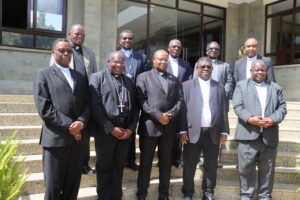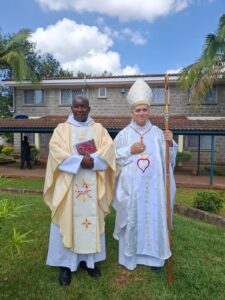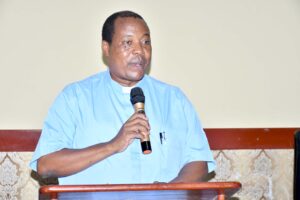KENYA: Grasping Our Mission on World Mission Sunday

By Elizabeth Asasha
As Catholic faithful across the world prepare to mark the annual World Mission Sunday on October 22, raising awareness of the life-giving work of lay and religious missionaries globally, it is a cardinal obligation to give careful thought to the gospel and the connection with this year’s theme, “Hearts on Fire, Feet on the Move.”
The gospel verse from the book of Matthew 22:15-21 presents a captivating experience between Jesus and a gathering of people who pointed to trap Him in a web of discussion. It may be an entry that calls us, as Christians, to reflect profoundly and deeply on issues of confidence, morals, and the crossing point of the otherworldly and common domains. The Pharisees, in conjunction with the Herodians, drew nearer to Jesus with a slyly formulated address: “Is it legal to pay the census access to Caesar or not?” This inquiry was an unobtrusive endeavor to drive Jesus into a problem. In the event that He pushed paying charges to Caesar, He would be seen as compromising the devout character of the Jewish individuals and possibly estranging His devotees. On the other hand, if He contradicted paying charges, He would be denounced by opposing Roman specialists and seem to confront lawful results.
In reaction to this calculated address, Jesus skilfully explored the circumstance. He asked for a Roman coin, indicating the picture and engraving on it. By doing so, He coordinated consideration of the natural and fabric perspectives of life that have a place in Caesar, emphasizing the significance of satisfying civic commitments. This intelligent reaction highlighted the thought that we ought to regard and fulfill our natural obligations whilst keeping up our commitment to God. The significant message inside this section expands past the particular issue of charges. It reminds us of the double nature of our presence as Christians. We live within the world, with obligations to society and the state, but we are moreover called to preserve a solid otherworldly association with God. This section empowers us to observe the boundaries and qualifications between the transient and the divine, emphasizing that both are fundamental and ought to coexist agreeably.
Moreover, Jesus’ reaction uncovered the false reverence of those who looked forth to trap Him. He recognized their unscrupulousness, as they were employing an address almost as a guise to dishonor Him. This highlights the significance of genuineness in our confidence and intelligence with others. As Christians, we are called to be honest, genuine, and propriety in all our activities.
In our lives, we are frequently confronted with complex moral predicaments and circumstances that challenge our confidence and standards. The experience between Jesus and the Pharisees serves as an update that, as devotees, we must approach these circumstances with shrewdness, insight, and a commitment to truth. We ought to endeavor to preserve our astuteness, both in our natural obligations and in our otherworldly travel, whilst being mindful of the eagerness of those who may seek to weaken our confidence.
In the first reading, reminds Christians that God encompasses an arrangement and works in puzzling ways, frequently utilizing unforeseen individuals to achieve His purposes. It emphasizes that God is one of a kind and incomparable, and it empowers us to share His message of compassion and sovereignty with the world. In straightforward terms, it tells us to believe God’s arrangement, indeed when we do not get it, and to share His adoration with others.
Similar to Cyrus, God can make good use of us in unforeseen ways to fulfill His divine reason within the world. The second reading, the opening verses of Paul’s letter to the Thessalonians, discover a message that emphasizes central Christian values and the transformative control of the Gospel. It talks of living in God’s elegance and peace, communicating appreciation, effectively working out one’s confidence in adore and trust, understanding God’s adore and choice, and recognizing the life-changing effect of the Gospel, which challenges devotees to live it out with conviction. These verses rouse Christians to grasp these values and feelings and embrace them all through their journey with confidence.
As Pope Francis continuously asserts, the Catholic Church is a comprehensive asylum. Its entryways are open to all, independent of geological or social qualifications. It stands as an image of solidarity, serving as an update that we are all part of a larger community, bound together by shared confidence and reason. It could be a space where the mission takes root and thrives.
Philosophical Wisdom and the Mission
Various philosophical concepts, such as Emmanuel Kant’s deontology, Aristotle’s eudaimonia, and Plato’s idea of salvation, resound with the basic standards of the mission. When harmonized with our faith, these philosophical underpinnings direct us on our travel to fulfill our reason. Cherish, bliss, and benevolence frame the bedrock of our activities as we seek after this mission, resounding the lessons of St. Francis of Assisi.
Emmanuel Kant, a famous logician, proposed the concept of deontology, which centers on ethical obligation and the significance of doing what is right. Within the setting of the mission, Kant’s reasoning resounds by emphasizing the ethical obligation of Christians to bear witness to Christ’s adore. It energizes us to act with judgment, genuineness, and an unflinching commitment to the mission.
Aristotle’s idea of eudaimonia, or human thriving, underscores the interest in a meaningful and intentional life. Within the mission, we discover our extreme reason, which is to serve God and humankind. It is through acts of adore, sympathy, and confidence that we accomplish eudaimonia, finding fulfillment in satisfying our divine mission.
In a world frequently checked by divisions and vulnerabilities, World Mission Sunday sparkles as a reference point of trust. It reminds us that we all have a reason, and a mission to accomplish. Whether propelled by Pope Francis’ call to bear witness, the exceptional account of Pauline-Marie Jaricot or the philosophical experiences that light our path, our mission remains clear: to spread adore, confidence, and trust.
As we contemplate the message of “Excited hearts in movement,” we recognize that our shared reason is to be instruments of peace, to sow cherish where there’s scorn, and to bring brightening to obscurity. The mission is all-inclusive, and it could be a travel of the heart. In the words of Pope Francis, “Heart talks to heart.” Let us grasp our mission with open hearts, fuelled by cherish, bliss, and kindness. Together, able to be witnesses of Christ, satisfying our divine reason and joining together the world within the soul of the mission.


